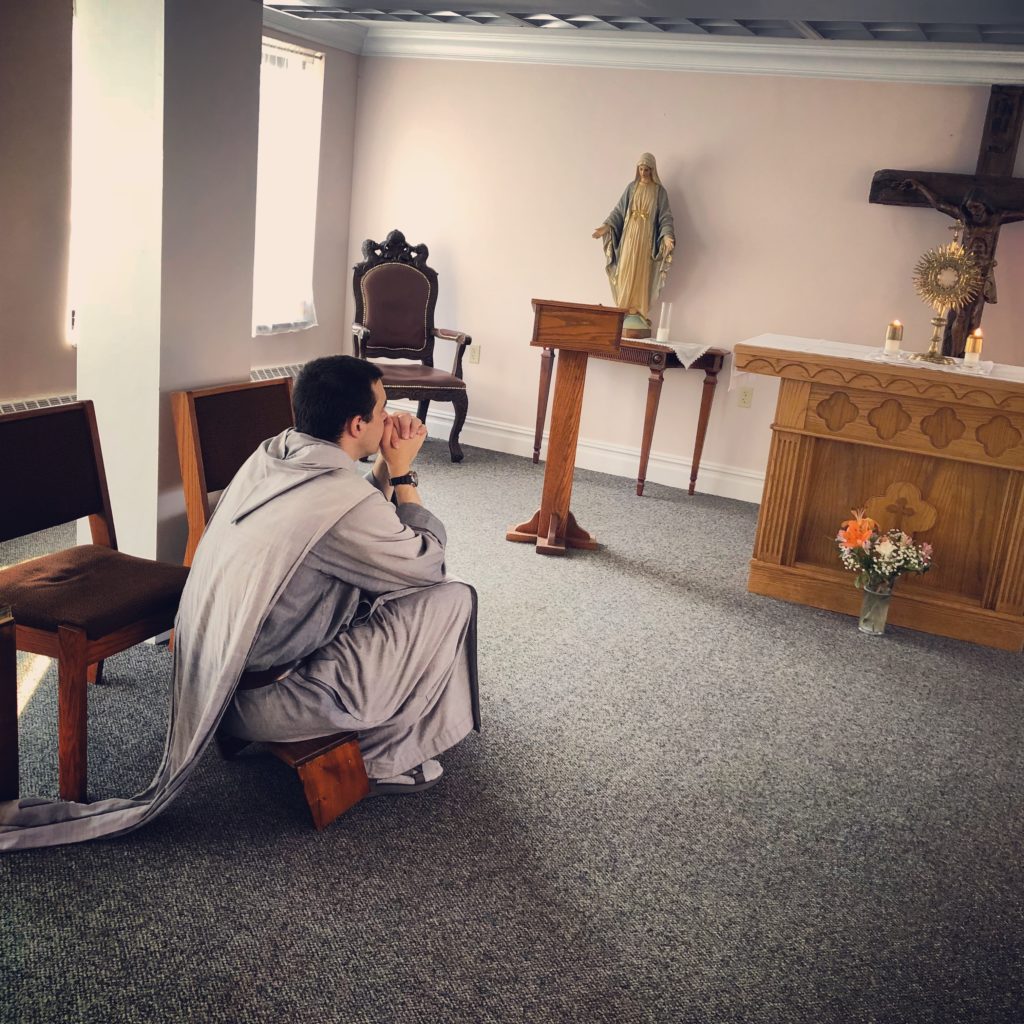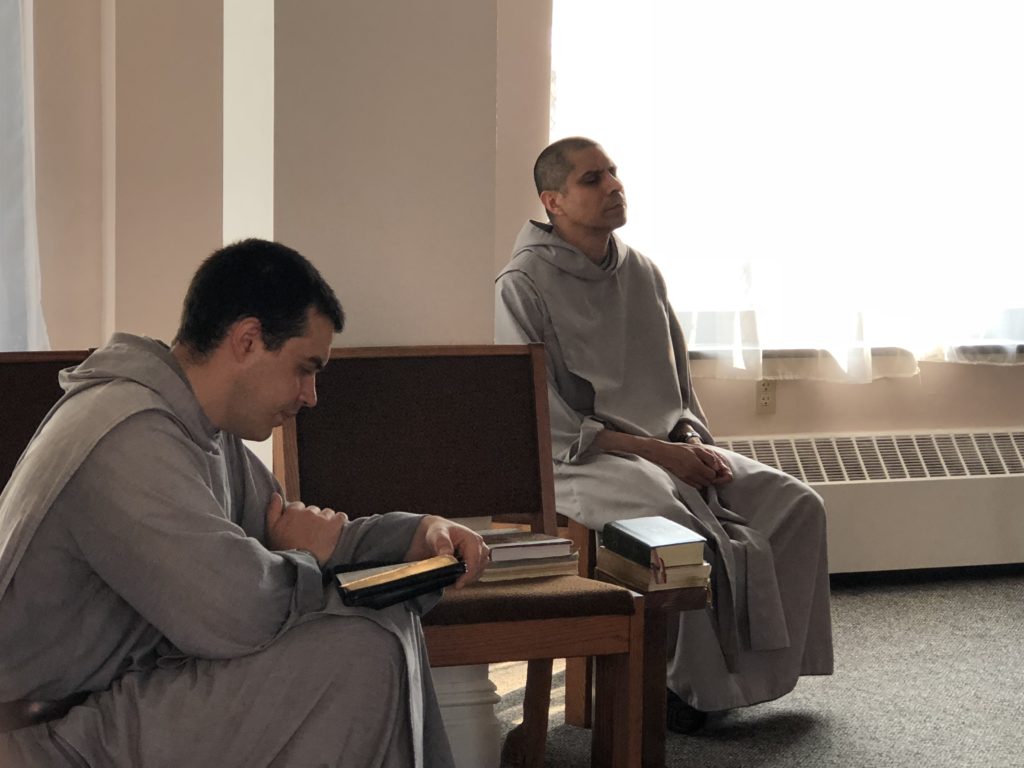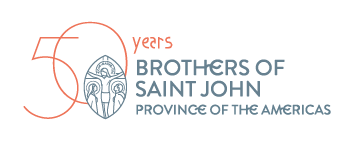By Br. John Timothy
I experienced the joy of the truth in a major way the year after I graduated from college. As a student I studied physical anthropology, which is basically rooted in Darwin’s theory of evolution and aims at discovering and understanding the origins, at least the material origins, of human beings. I found this subject fascinating, especially since I had grown up in an intellectually more conservative context in the Deep South, where evolution was not taught in schools. It felt like a kind of intellectual emancipation or enlightenment that challenged the status quo of my previous ideas. However, this particular academic environment was not a very “believing” milieu, and unfortunately, I had the experience of at least one professor using science as a pretext for denying the existence of God, which, at the time, I didn’t understand to be a breach of the limits of empirical science. Since I was not well rooted in my own faith, I jumped on the bandwagon of academic atheism, and let go of any real practice of faith, including personal prayer.
Of course, beliefs affect choices, and for me, letting go of faith also meant letting go of any meaningful moral compass. The result of this intellectual and moral experiment was devastating for me. I found myself profoundly dissatisfied and disillusioned with the meaning of life. I found myself asking, “Is this all there is to life? Are human beings nothing more than a product of a random material process and is there no meaning to the direction of my life?”

However, this “devastating” moment of near despair turned out for me to be a moment of grace. In my desperation, I spontaneously looked around for people who were living joyful and meaningful lives. The most obvious such person for me was my mom, and I decided to call her and share my dilemma with her. Her advice to me was to pray. I had long since abandoned the practice of prayer, but I was basically at the end of myself and willing to give it a try. I prayed something like, “God, if you exist…” and then named two very specific needs. I asked for someone who could help me reconcile my interest in science and my desire to believe in God.
Until that point, I had believed that the two must be mutually exclusive. I mistakenly thought that to “believe” in science meant to accept that there is no God, and that in order to believe in God, I would have to be “stupid” or naïve, denying the apparently well-established facts of science. My second petition was for something new to do on Thursday nights, because Thursdays were the nights that my friends went out to the bars. I didn’t want to go out to bars anymore, and I didn’t want to stay in the apartment by myself. To my utter amazement, I received such an undeniable answer to my prayer within about a month or so, that I spontaneously believed in God and his love for me, shed tears of joy, and called my mom to share the good news with her. This was my first encounter with the joy of the truth.
Of course, this was the beginning, and not the end, of a new journey towards God. Having tasted this profound joy, my heart was opened to seeking and deepening my knowledge of God and desiring a relationship with him. Who was this God who heard my prayer and answered me? I began a very informal research, reading various books and articles that had anything to do with God. I wasn’t sure exactly where to start. I had grown up in the Methodist church, so, after visiting a Unitarian church and not finding my place there, I naturally decided to give the local Methodist church a try. Providentially, the very day I visited was the day that the entire congregation was renewing their baptismal promises. I found deep meaning in this act, and was reminded of my own baptism.
So it was that I found my way back into a faith community after many years away. However, I continued to thirst and thirst for more knowledge and experience of God. I had experienced his goodness to me, and there was a kind of new flame within me longing to draw nearer to him. I continued reading and searching. My beliefs were by no means very clear or solidified at that point, even though I was attending church. I even took some interest in Eastern religions, trying to find the truth. However, at a certain moment, I decided that I wanted to be a disciple of Jesus Christ. I just felt that the Gospel was true, and that Jesus was the way and the truth.
This was no small decision, and I remember getting on my knees to say to God that I wanted to be a disciple of Jesus Christ. I felt somewhat afraid, because I was familiar enough with the teachings of Jesus to know that following him meant taking up my cross. I was willing to pay any price to follow him though, so, on my knees, I told him that I wanted to be his disciple, no matter what the cost. My most burning question at that point became, “Where is Jesus? And how do I follow him?” How could I follow someone who lived and taught over 2,000 years ago, and how could I find him now? Gracious and wonderful as my experience in the Methodist church was, I found that I was longing for something more. I felt that something was missing, and I wanted to find Jesus.

At this time, my personal readings were becoming more Catholic, and I was attracted by certain signs that I saw as pointing to a real presence of Christ. I learned about the desert fathers and their radical flight from the world to pursue a life of union with God in prayer and contemplation. I saw that tradition as an example of men and women taking to heart the counsels of Christ to sell everything, give to the poor, and to follow him in a life of radical discipleship. I also saw that this beautiful tradition has remained even to the present day with many consecrated men and women taking the Gospel to heart and “putting their lives on the line” to follow the same evangelical counsels. I saw a similar sign in the celibate priesthood, thinking that no man could live a happy and fulfilled life alone, unless there was a true union with Christ sustaining him. My question, “Where is Jesus?” and these signs surrounding me were beginning to point me more in the direction of the Catholic Church.
Finally, I knew that if I wanted to follow Jesus, it needed to be a daily discipleship, and not just once a week on Sunday. I wanted to begin each day with some kind of devotion, like reading the Bible and prayer. However, I quickly found that I lacked the necessary discipline to practice such daily devotion on my own, and that I was in need of the support of a community. That is when the thought occurred to me that Catholics had the possibility of going to church every day for daily Mass if they wished. Without knowing much about Mass, but with a desire to find a Christian community to support me in my discipleship with Christ, I Googled “Catholic Church near me”. To my surprise, there was one just on the other side of the block where my apartment was, Christ the King Catholic Church. And so I decided to give it a try.
Very unlike myself, I woke up early and went to the 6:30am weekday Mass. There I found a sanctuary of peace and silence. It was winter of 2010, and I was very moved to see ordinary people praying in silence and peace on a weekday before going to work. I listened attentively to the words of the Mass, and the impression that I had was that these words were not the words of men, invented by an individual, but that these were words given by God. Having never heard these words before, they struck my spirit in a totally different way than all the words of the world ever had. They were sacred. I didn’t understand everything, but I knew that I was in the presence of something holy, especially at the moment of the elevation of the consecrated host, when everyone knelt in silent adoration. Fortunately, I did know that I could go up and receive a blessing from the priest even though I couldn’t receive communion. He was an elderly man, and as he blessed me, I remarked that his eyes were of an uncommon depth and spirituality, that indicated a man who was immersed in prayer and relationship with God.
After two or three days of attending the weekday Mass, I called the rectory and asked to speak to the priest who celebrated the 6:30am Mass. He was expecting a call, saying that he hadn’t seen too many other non-Catholic young men attending daily mass. I explained to him my situation, that I had been intellectually well-fed my whole life, but that I was spiritually starving. I was longing to know the truth about God. It turns out that he was also a convert from years ago, and was able to calmly and confidently respond to my every question. We began meeting once a week to study the Catechism of the Catholic Church, and having accepted to study it with humility and an open heart, I received the gift of faith. I knew in the depths of my soul that what I was reading was true! Again I experienced the profound joy of the truth. What’s more, having understood from the Catechism what takes place at the Mass, I discovered the answer to my burning question: “Where is Jesus?” He is in the Catholic Church! He is alive today and waiting for me to come and spend time with him in prayer! He is offered to me daily in Holy Communion! What an inexpressible joy!
So I was received into the Catholic Church the following Easter Vigil, and my thirst for the truth has not subsided since. I have discovered the beautiful doctrine of the Catholic faith of the harmony that exists between faith and reason, and so I am able to take up my previous questions about the origins of man with new clarity and confidence, not rejecting science, and not using science as a pretext to reject God. I have also found my moral compass, embracing the daily challenge of conforming my whole life to the faith that I professed, and discovering that though I fail daily, God’s mercy renews me constantly. I entered religious life in 2011, and I rejoice to be on the path of discipleship that I so longed for, not despairing at my imperfections, but trusting in the goodness of the Lord, which I have tasted for myself.

